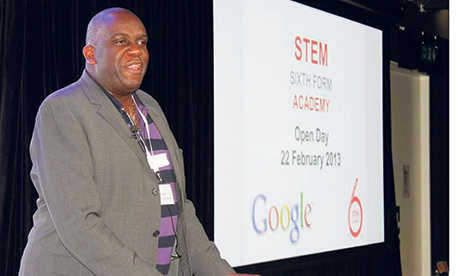Education, economy and industry – STEM sells as open day focuses on money

Open for business: Dr Tony Sewell at the event held at Google's HQ in Bloomsbury
Who here wants a lot of money? was the opening question as Dr Tony Sewell, founder of the charity Generating Genius, addressed a mostly teenage audience at the STEM Academy Sixth Form (STEM6) open day, held last month on the 19th floor of Google’s headquarters in Bloomsbury.
A scattering of hands went up. “Londoners and London students like their money – STEM will give you that route through – you will be well off,” he assured them.
The free school, for 16-19 year olds, will aim to provide students with unprecedented access to industry alongside qualifications in STEM (Science, Technology, Engineering and Maths) subjects – in particular the tech giants that have set up shop on the ‘Silicon Roundabout’.
STEM6, founded by the Skills and Development Agency, has now secured a building on City Road as part of ‘Tech City’. Subject to a funding agreement and community consultation, it is set to open in September 2013.
“We don’t like little companies. We like big companies,” he continued. “You’re now entering the big time. I’m encouraging you all to sign up for STEM Academy and open up that Pandora’s box.”
In theory, that box contains specialised training, access to top apprenticeships, and not just employability, but affluence. The average starting salary for STEM graduates is £23,000, compared with £19,000 for other subjects.
As university applications drop with rising fees (particularly among arts and humanities subjects, which have seen “above average decreases”) and graduates struggle to secure jobs, university chancellors are re-strategising to retain students. Hyper-specialised training, even at secondary level, may prove an attractive option to young people with their sights set on a career in a ‘STEM industry’.
Thien, 16, hopes to study computer programming at Imperial College, and sees STEM6 as an exciting option. “It focuses on computer sciences. I’m interested in that field and it’s something new.”
STEM6 may be the perfect place for someone like Thien, with the industry in need of new recruits.
STEM6’s Principal Designate John O’Shea, Powerpoint clicker in hand, all but declared a state of emergency for ‘STEM industries’ in the UK.
He spoke of a dire need for engineers, and of India “churning out more science graduates than anywhere else in the world”.
To ensure students are at the top of their game, O’Shea promised “target-based learning” at STEM6 and “swift intervention” for those falling behind.
The Royal Academy of Engineering has found that British industry will need 100,000 new graduates in STEM subjects every year until 2020 just to maintain current employment numbers.
The government, keen to catch up, has come to the rescue. £50m of Treasury funding has been injected into the Old Street Roundabout to create a haven for tech giants and startups alike — London’s answer to California’s Silicon Valley.
And Education Secretary Michael Gove’s ‘free schools revolution’ has created the space for secondary education to ride the wave. As independent bodies bid to open their own state schools, options for state secondary education are becoming increasingly diversified.
Hackney councillor Rita Krishna said: “Nationally there’s been an issue about how best to design the right qualifications for young people from age 14. I see the STEM Academy as occupying a bit of that space. It’s unfortunate that the only model it was possible to set it up as was as a free school. But young people have got to be at the cutting edge.”
In the current climate, this means following the cash. Synchronicity between charities, industry giants and education providers has obvious benefits, not least for students.
At the open day, Google’s Shuvo Saha told students: “When we heard about the launch of STEM6 we thought that this was something we had to support.” He explained that an education at STEM Academy can “lead you to a career at a place like Google”.
The word ‘support’ continued to buzz through the room at STEM6’s open day, but critics are concerned this mutual support brings state education dangerously close to the private sector.
Mark Lushington of the National Union of Teachers warned that the free schools revolution is “a softening up … a tenderising” for the introduction of the private sector into state education.
“Education has become about training for the specific needs of the economy”, he said, “and I’m not sure it should be.”
The public consultation closes 29 March.
For more go to Stem Academy.
Note: this article was amended at 6.30pm Thursday 14 March to include additional information that had previously be excluded due to a subbing error.
